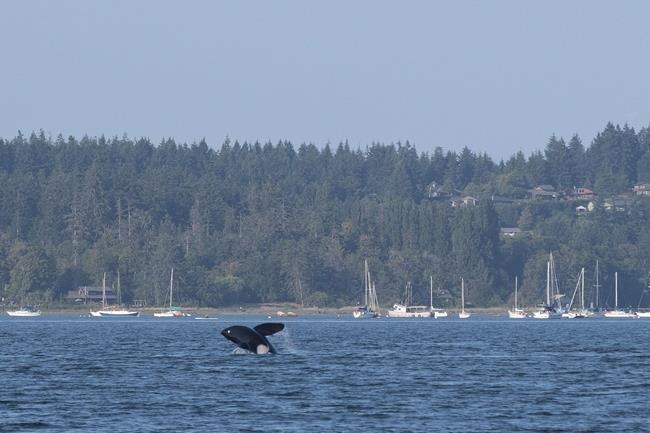VANCOUVER — The federal government has announced several measures, ranging from sanctuary zones to fishing closures, as it works to protect critically endangered southern resident killer whales off the British Columbia coast.
But an expert says the measures need to go much further to help the animals thrive.
The federal departments of fisheries, environment and transport issued a joint news release on Wednesday outlining what is described as a fifth consecutive year of action to protect and restore the southern resident population.
There are 10 measures this year, including mandatory 10-knot speed zones in two areas near Swiftsure Bank, northwest of Victoria, a rich feeding ground for the salmon the resident whales like to eat.
Commercial and recreational salmon fisheries will be banned this summer and fall throughout the waters of the southern Gulf Islands and there will be interim sanctuary zones restricting all vessels from two areas off Pender and Saturna islands in the southern Gulf Islands.
From now until May 31, 2024, vessels are required to stay at least 400 metres away from all killer whales in southern B.C. coastal waters between Campbell River and Ucluelet, including Barkley Sound and Howe Sound.
The federal government said if whales approach, boaters should put their engine in neutral and wait for the animals to pass.
Lance Barrett-Lennard, a cetacean researcher and senior research scientist with the Raincoast Conservation Foundation, said this year's measures are largely continuations from previous years with some tweaks to accommodate the concerns of sport fishers.
"The southern resident killer whales continued to do rather poorly, they're not thriving," he said.
"And I think we really need strong actions, including much, much broader fishing restrictions throughout their critical habitat."
The endangered whales roam waters off British Columbia and the U.S. northwest. Their dwindling population sits at 73, according to data from the American Marine Mammal Commission.
Barrett-Lennard said the whales have been coming more frequently into the Strait of Georgia during winter months over the last several years and he's disappointed most protections don't cover that time.
Earlier this month, lawmakers in Washington state voted to require all boaters in their waters to stay a minimum of 1,000 yards, or 914 metres, away from southern resident whales, an increase from the current rule of 400 yards.
Assuming the changes are approved by Gov. Jay Inslee, they wouldn't start until 2025.
Barrett-Lennard said he wishes the American changes were coming sooner and thinks Ottawa should match them with a 1,000-metre rule for all non-commercial vessels.
He said Canada's current 400-metre rule for southern resident whales is not based on science, and whales' ability to echolocate is still impacted by boats at that distance.
Ottawa's statement said in the coming year the Fisheries Department will be launching a consultation process to consider changes to approach distances for killer whales on the Pacific coast.
"Any potential changes to the marine mammal regulations will be based on partner and stakeholder feedback to date, as part of the consultation process to come as well as scientific advice," it said.
Transport Minister Omar Alghabra said in the statement that it's imperative efforts continue to ensure a quieter, safer environment for the iconic, vulnerable species.
Fisheries Minister Joyce Murray said the whales are a symbol of Canada's Pacific and have cultural significance for coastal communities and Indigenous Peoples.
"The measures we are implementing in 2023 demonstrate Canada's commitment to protect these remarkable marine mammals and preserve their cultural and ecological significance," she said.
Barrett-Lennard said southern resident killer whales are near the top of the food chain and require a functioning ecosystem from top to bottom to survive.
"If we can bring in the kinds of conditions that help us maintain this killer whale population, we're actually doing right by everything else," he said.
This report by The Canadian Press was first published April 26, 2023.
Ashley Joannou, The Canadian Press



